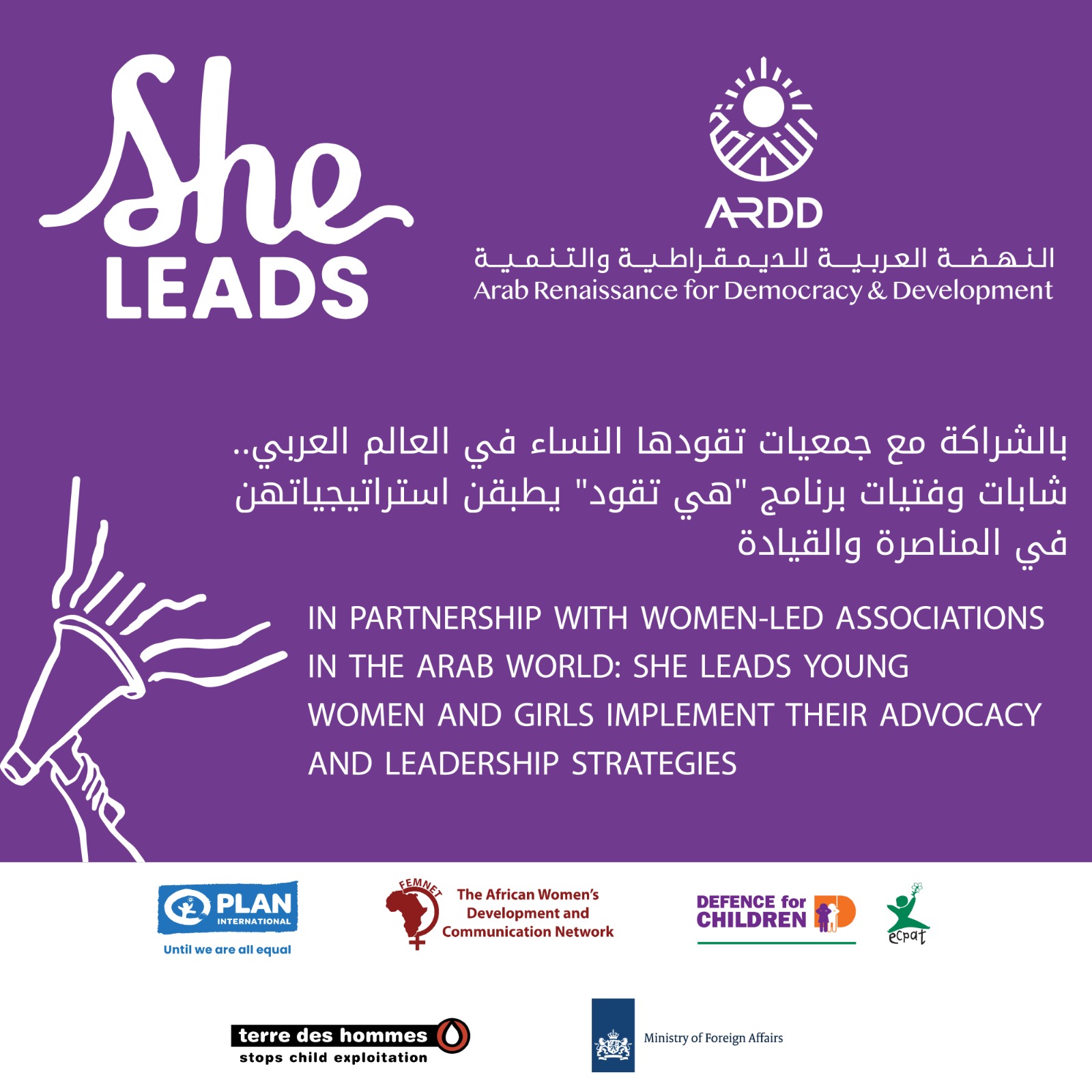Following the interactive educational training for girls and young women within the She Leads program, participants recently implemented their advocacy plan, simulating and practicing their advocacy and leadership skills by launching initiatives on various community issues, and networking with different parties.
The educational program was implemented in accordance with memoranda of understanding signed by the Arab Renaissance for Democracy and Development (ARDD) with women-led associations, initiatives, and organizations, and in cooperation with the Human Rights Forum for Family Issues in Lebanon, the Ana Insan Association for the Rights of Persons with Disabilities in Jordan, and The Association of the Egyptian Female Lawyers in Egypt.
The participants in “She Leads” participated in awareness, training, and capacity-building sessions over the period of four months, to help and motivate them to think and identify areas through which they can make a difference and take part in decision-making within their communities, where participants are expected to later create advocacy groups and initiatives even after the end of the program.
Meetings were also organized in cooperation with the Jordanian “Ana Insan” association, supervised by disability rights activist and member of the Upper House of Parliament Asia Yaghi, to discuss local and international laws and conventions related to the rights of persons with disabilities. The meetings were attended by 22 participants, in addition to holding training courses on “Etiquette for dealing with people with disabilities” with the participation of 17 participants. The participants also had the opportunity to exchange ideas on their advocacy plan, set personal and professional goals, and develop their communication skills, as well as attending a panel discussion on the Universal Periodic Review, established by the UN General Assembly and aimed at urging States to promote, protect, support, and expand human rights in each country.
In Egypt, in cooperation with The Association of the Egyptian Female Lawyers, a round table was organized that brought together ten participants with members of the Egyptian Parliament and human rights activists, to discuss the issues of persons with disabilities, where they addressed amendments to the disability law, experiences of integrating persons with disabilities in artistic work and jobs, personal challenges of social integration, and the efforts of the National Council for Women to support women with disabilities. The round table also focused on how to implement the advocacy plan for participants, through the production of an animated short film that highlights the needs and rights of persons with disabilities in Egypt.
Meanwhile, participants in Lebanon had the opportunity to sit down with stakeholders, including expert lawyers and specialists in child custody cases, after the Family Rights Forum invited them to discuss custody laws and challenges related to this issue, and to gain insights into their stories and needs to move forward with the practical implementation of their newly acquired skills in advocacy and leadership. At the end of these activities, an awareness video was launched highlighting the issue of custody in Lebanon and its impact on the mental health of children and parents.
Commenting on the importance of these initiatives, participants in Egypt, Jordan, and Lebanon explained that the initiatives they came up with aim to influence positive change in societies by supporting social issues and enhancing social interaction, as the program contributed -according to them- to developing their leadership skills and expanding their understanding of social issues, calling for “more training opportunities and exchange of experiences with community leaders, and for sustained support and awareness opportunities to effectively impact society.”
The participants stressed that the importance of the initiatives is reflected in many things, most importantly that girls have official places where they can speak up about women and their leadership, as well as learning how to write advocacy content and work on a specific issue and communicate it to people correctly, pointing out that the program enhanced their communication skills “with the relevant authorities that we want to communicate our issues to, and opened up new horizons for us to talk about current issues, the most important of which is the Palestinian Cause, through social media.”
The “She Leads” program aims to support equitable representation between men and women to participate more in decision-making processes, through capacity-building activities that focus on increasing girls’ and women’s access to education and skills development, promoting women’s economic empowerment and engagement in the political process, building their advocacy skills, creating meaningful interaction, and raising awareness among them, through a collaborative and inclusive approach at the regional and international levels.


